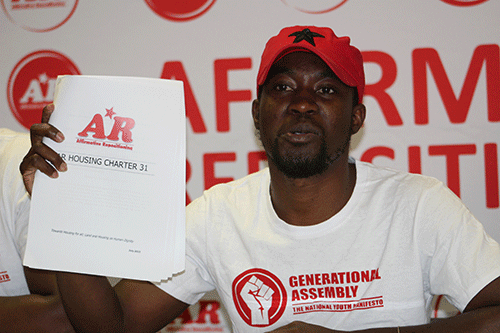Despite various attempts by the anti-redline activist’s lawyers for the public to get involved and contribute to the legal battle to remove the embattled veterinary cordon fence, only N$2 200 has been collected so far from the public.
In his ongoing battle for the removal of the veterinary cordon fence, known as the redline, Job Amupanda, the leader of the Affirmative Repositioning movement, appears to be battling alone, as there has been minimal public support in terms of contributing to his legal costs.
In his supplementary affidavit, dated 12 September, Amupanda is asking the court for a protective costs order in case he loses the case.
The political activist finds himself embroiled in a lone legal struggle against the government and Meat Board, who have hired four advocates to oppose him in the Supreme Court matter.
“The fight to remove the redline continues in our courts. The government is now taking Job Amupanda to the Supreme Court because they are not happy with the High Court’s order by Judge Ueitele,” this was said by his lawyer Kadhila Amoomo on social media last weekend.
Amupanda estimated the legal expenses required to challenge the redline to be more than N$7 million.
He broke down these costs, stating, “The legal fees for attending to argue the opposition to the costs protection application are estimated to be N$356 000”.
Additionally, he noted that the discovery stage, which involves sifting through a substantial amount of documentation spanning over a century and historical accounts detailing the construction of the fence is projected to cost N$2.4 million.
Furthermore, Amupanda indicated that engaging expert witnesses and drafting witness statements, which he estimated would take approximately five days, would come to N$890 000.
If the matter were to proceed to trial, Amupanda anticipated it would likely extend for at least twenty court days, resulting in approximately N$3.5 million in legal fees.
The presidential aspirant also expressed deep concern that the legal costs incurred by the defendants up to this point would potentially lead to his bankruptcy, putting the well-being of himself and his family in jeopardy.
He lamented, “If I had access to more funds or funding, I would have enlisted the services of a senior counsel for this matter. I am actively seeking a sympathetic senior counsel, as I believe this case warrants the expertise of the best legal minds”.
Despite estimates that the defendants would incur legal fees of N$178 000 per day, Amupanda disclosed that his monthly contribution to his legal practitioner is a modest N$1 000.
He observed a lack of substantial public support for his cause, as he had only managed to raise N$2 200 from the public to contribute to his legal expenses.
He shared, “I have been reaching out to the public for assistance in this matter, and some individuals have generously contributed as little as N$100”.
In contrast, Amupanda alleged that the Meat Board had filed three notices of exception, each incurring a cost of approximately N$208 000 per day for each exception.
Legal matters
In 2021, Amupanda dragged the government to the High Court, demanding the removal of the redline.
He cites the existence of the redline as degrading, inhumane, discriminatory and unconstitutional.
Amupanda said the redline was used to divide, rule and restrict the movement of black people and their livestock during the colonial era; thus, he argues, it serves no purpose anymore in an independent Namibia – as such, it violates articles 8 and 10 of the Constitution, which protects the dignity and equality of citizens.
In August, Amupanda sought a protective costs order after Meat Board’s indication that it would seek an order for wasted costs in addition to opposing the application for wasted costs.
“Due to his limited financial resources, he will not be able to pay the defendants’ legal costs if his action is dismissed with costs,” reads court documents.
This was, however, opposed by the defendant (Meat Board) on the grounds that Amupanda failed to satisfy all the requirements.
The court granted leave to Amupanda, so he may file the necessary documents to highlight his financial standing and the estimated cost of litigation.
Amupanda filed the documents as ordered by the court on Monday.
In the affidavit, Amupanda declared that his total income on a monthly basis ranges between N$50 000 – N$65 000 from both the University of Namibia, where he is a senior lecturer, and his duties as a councillor in the City of Windhoek.
He also declared that his monthly total expenditure is N$53 000, which is against the total income.
“It would mean that my disposable income is N$11 689,” said Amupanda.
Amupanda argued that compared to his defendants in this case, the government and Meat Board, the government was allocated N$48 million to handle the litigation.
While the Meat Board, which is also a public enterprise, in 2021/22, made an income of N$51 million and also has investments totalling N$40 million with various companies.
The government has consistently asserted that there is currently no urgent public interest necessitating the resolution of the constitutionality of the ongoing use of the redline for animal health control.
The matter is scheduled to be in court on 26 September for the court to determine a way forward.
Caption:


